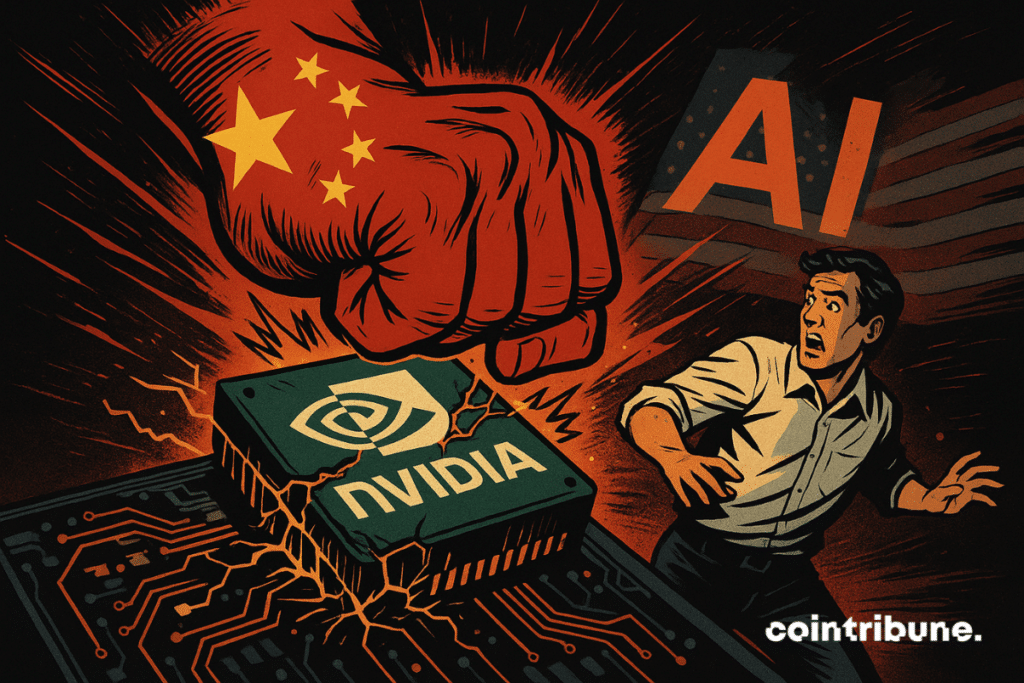Nvidia’s AI Chip Testing Halted by China’s Sudden Order - Tech Giant Faces Major Setback
China slams brakes on Nvidia's AI ambitions—testing grinds to halt amid escalating tech tensions.
Geopolitical Chess Move
Beijing's unexpected directive cuts Nvidia's access to critical testing facilities, throwing a wrench into their AI development timeline. No warnings, no phase-outs—just an immediate stop order that caught everyone off guard.
Supply Chain Whiplash
Manufacturing partners scramble as shipments get held at customs. Production schedules face indefinite delays while compliance teams work overtime to navigate the new restrictions.
Market Reactions
Shares dip as analysts recalculate growth projections—because nothing says 'stable investment' like geopolitical whims dictating quarterly earnings. Wall Street's algo-traders barely blink before adjusting positions.
Long-term Implications
This move signals tougher road ahead for foreign tech firms in China. Nvidia now faces recalculating its entire China strategy—if there even is one left to salvage.

In brief
- Beijing orders Alibaba, ByteDance and other tech giants to stop their purchases of Nvidia AI chips.
- The directive from the Cyberspace Administration of China specifically targets the RTX Pro 6000D.
- Several companies had already started tests and planned massive orders before being forced to back down.
- The decision reflects Beijing’s desire to accelerate its technological autonomy in the face of American restrictions.
A targeted ban on Nvidia AI chips
The Cyberspace Administration of China (CAC) issued a formal directive against several Chinese technology giants, including ByteDance and Alibaba.
The order is clear: immediately suspend all ongoing tests and orders related to Nvidia’s RTX Pro 6000D chips, which were specifically developed to circumvent American restrictions on advanced semiconductors.
Here are the key facts :
- The CAC explicitly asked several groups to stop any use of the RTX Pro 6000D, the artificial intelligence chip launched by Nvidia for the Chinese market ;
- Some companies had already begun tests and validation processes with Nvidia-partnered server suppliers, with orders amounting to tens of thousands of units ;
- Following the directive, these companies immediately halted all ongoing operations, with no public comments from the concerned groups to date ;
- This ban goes further than previous ones, which only targeted the H20 model, an earlier version also designed for the Chinese market.
Asked during a press conference in London, Jensen Huang, Nvidia’s CEO, acknowledged the impact of this decision, while adopting a measured tone. “We can only serve a market if a country wants us to do so,” he said.
He added : “I am disappointed by what I see, but China and the United States have broader agendas to resolve. I am patient on this.” This statement comes as Beijing has just accused Nvidia of violations of its anti-monopoly legislation, and tense diplomatic exchanges continue between the two countries.
In this context, the Chinese decision can be interpreted as a strategic response to the American escalation on the front of technological restrictions.
An assumed strategic fracture : Beijing accelerates its technological decoupling
What distinguishes this ban from previous ones is its scale. Until now, Chinese restrictions mainly targeted the H20 chip, another version designed by Nvidia to remain compliant with American sanctions.
This time, Beijing directly targets the very latest generation, the RTX Pro 6000D, which had just been launched. This intensification reflects a strategic shift by Chinese authorities, who no longer merely slow down certain products but now appear determined to actively break their dependence on critical technologies coming from the United States.
Faced with successive American restrictions on advanced semiconductors, China, an influential member of the BRICS bloc, is multiplying initiatives to support its own hardware and component players. Demand for the RTX6000D was already limited even before the ban, with some Chinese companies deliberately choosing not to place orders. This could signal a growing confidence in local alternatives, even if they remain technically inferior at this stage.
In this climate, Nvidia finds itself in a delicate position. Deprived of a strategic outlet, the company sees its prospects in China darken, with a potential impact on its revenue, particularly in segments related to AI and, by extension, sectors dependent on computing power like Web3.
Maximize your Cointribune experience with our "Read to Earn" program! For every article you read, earn points and access exclusive rewards. Sign up now and start earning benefits.

